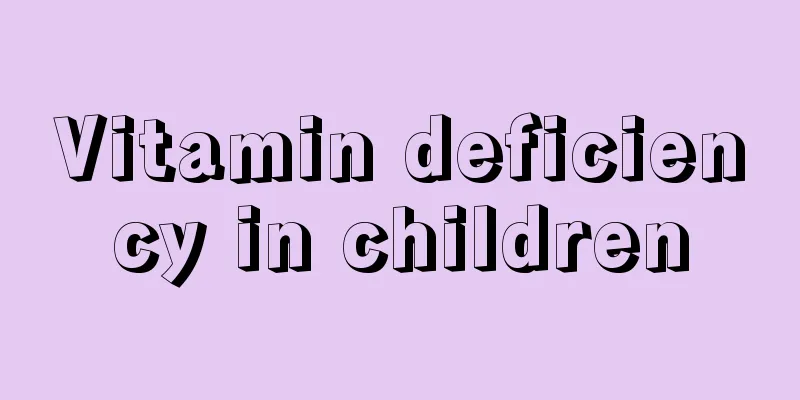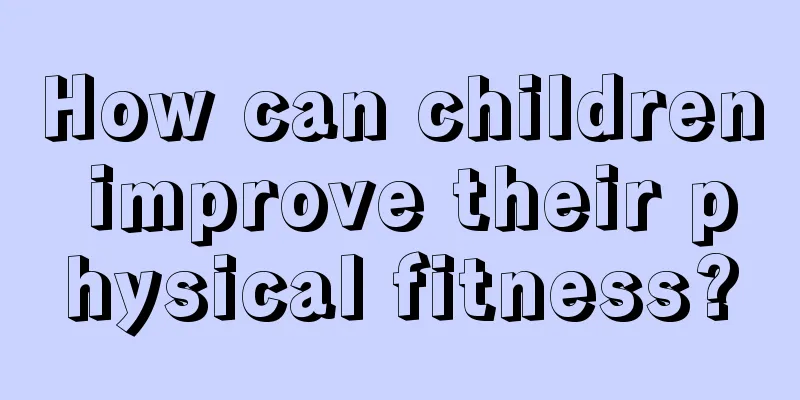Vitamin deficiency in children

|
The situation of children lacking vitamins is quite serious and will seriously affect their physical development, so mothers are advised to pay attention to their baby's balanced diet. If a child lacks any kind of vitamin, different symptoms will occur. For example, a lack of vitamin A will cause the child to have dry and rough skin and brittle nails, while a child's lack of vitamin E will cause abnormal nerve regulation. 1. Vitamin A deficiency The child's skin becomes dry and rough, with small bumps all over the body, like chicken skin; the hair is sparse, dry, and dull, and the nails become brittle and changed in shape; the conjunctiva and cornea of the eyes (commonly known as black eye) also develop lesions. In mild cases, the child will experience dry eyes, photophobia, and night blindness (commonly known as chicken eyes); in severe cases, the black eye becomes cloudy, ulcers form, and finally perforation occurs, causing blindness. People who are deficient in vitamin A generally have poor immune function and are susceptible to respiratory diseases such as colds. 2. Vitamin B1 deficiency If infants and young children lack vitamin B1, they are likely to suffer from symptoms such as loss of appetite, indigestion, weight loss, slow growth, etc. If the deficiency is severe, they are prone to beriberi, edema, muscle atrophy, slow heartbeat, etc. Since vitamin B1 is also involved in carbohydrate metabolism and nerve conduction in the body, and is involved in the composition of pyruvate decarboxylase in the body, when it is deficient, the activity of this enzyme decreases, the pyruvate level in the blood increases, the body's energy production decreases, and the brain's energy metabolism is impaired, resulting in pathological changes in the nervous system and other systems. 3. Vitamin B2 deficiency The facial skin is reddish, greasy, and scaly, which is medically known as seborrheic dermatitis. It not only affects beauty but also attracts bacterial invasion and causes folliculitis. At the same time, the tongue, lips, scrotum and other parts of the body may also become inflamed, causing pain and discomfort. 4. Niacin deficiency Niacin deficiency makes human skin particularly "delicate". Once exposed to the sun, it will develop rashes and the facial skin will become thicker and rough. Doctors call this pellagra. In addition, symptoms such as diarrhea, headache, insomnia, irritability, and dementia may also occur. 5. Vitamin C deficiency Vitamin C plays an outstanding role in hematopoiesis, protecting blood vessels and promoting brain development. If the intake is insufficient, the first symptoms will be decreased appetite, anemia, bleeding of the gums, nasal mucosa and skin, etc. It also has an adverse effect on children's IQ, causing their development to lag behind that of children of the same age. It can be seen that the symptoms of different vitamin deficiencies are different. The above introduces the symptoms of vitamin A, vitamin B1, vitamin B2, niacin and vitamin C deficiency respectively. If symptoms of vitamin deficiency occur, you can refer to the above content to determine which vitamin is deficient. |
<<: What to do if your child has an eye infection
>>: What to do if your child has poor stress resistance?
Recommend
How to supplement zinc deficiency in 2-year-old baby
Nowadays, mothers pay great attention to suppleme...
What is the standard for baby head circumference development?
The growth and development of a baby is a very im...
Why do new teeth not grow for a year when they are replaced?
Generally speaking, children will have all their ...
Newborn baby with blood tumor on head
A person's physical health is very important....
Will roseola infantum cause diarrhea?
Roseola infantum is also commonly known as roseol...
Children's soup recipe for nourishing qi and blood
Insufficiency of Qi and blood is a common problem...
What should I do if my baby has cavities?
It is very common for children to have tooth deca...
Baby sleeping with fever
If the child's whole body is hot when he is s...
Treatment of fever and cough in children
Children's physical health is what parents ca...
What are the physical methods for reducing fever in children?
Fever refers to a body temperature that exceeds t...
The child sweats on his head but not on his body
In fact, we don’t take sweating too seriously. Be...
Hand, foot and mouth disease recipes
Hand, foot and mouth disease is contagious, so tr...
What causes a child to vomit after eating?
Children's stomachs are relatively fragile, s...
What to do if your child has a recurring high fever
Since children have relatively weak resistance, t...
Children eat dragon fruit and their urine turns red
The nutritional value of pitaya is very high. It ...









